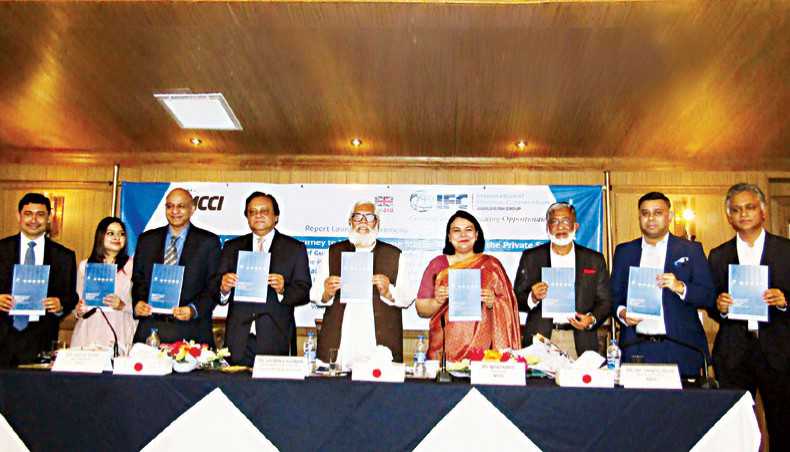Access to finance, corruption key issues for business growth

Image collected
More than 24 % of the Bangladeshi companies identified access to finance as the most difficult problem they faced in 2019 while another 18 % businesses ranked corruption mainly because the top constraint to help expand growth, according to a latest study statement of the International Finance Corporation.
The other top challenges include political instability, informal competitors, tax rates, customs and trade regulations, poorly educated workers, electricity, licensing and permits, access to land, transport, and crime and disorder, the analysis found.
The IFC and the Metropolitan Chamber of Commerce and Sector jointly organised the launching programme of the report titled ‘Bangladesh’s journey to middle income status: role of the private sector’ at the MCCI Gulshan office in Dhaka.
According to the study, prepared based on a survey in 103 leading businesses and detailed circumstance studies on 10 leading conglomerates of the united states, about 40 % firms got funding from retained earnings, 30 % right from banks and the rest from other networks.
IFC senior economist and program manager Masrur Reaz, senior economist Ali Zafar and consultant Faaria Tasin conducted the study.
The entire sentiment of investors was positive as about seven in 10 organizations were enthusiastic about rapid expansion while three in 10 were thinking about slow expansion and consolidation.
A lot of the local firms also faced challenges in getting foreign direct expenditure due to conducting business challenges, including beginning a business, registering house and approval procedure for FDI.
Firms were also reluctant to get listed on the currency markets for financing because of insufficient trust and insufficient consolidated balance sheets.
The businesses also ranked access to finance, customs administration and trade logistics, corruption, laws, order and reliability, informal and formal competition and taxes as the primary obstacles to expansion and greater investment.
The report articulated a reform roadmap to address the constraints to greatly help the private sector grow faster.
Access to financing could be increased through better governance of the banking sector, including image resolution of non-executing loans, merging more robust and weaker banks and streamlining of corporate relationship and commercial borrowing acceptance processes, the statement said.
Masrur said that micro policy management and mega-infrastructure insurance plan performed perfectly while trade coverage and regulatory governance brought mixture results.
Financing sector policy didn't succeed at all because the original liberalisation in 1990s was followed by erosion of governance criteria in 2010s with acceptance of new banks, bigger NPLs, regulatory failures with state-owned commercial banking institutions and liquidity crunches, this individual said.
Prime minister’s exclusive industry and expenditure adviser Salman F Rahman said that the individual sector should create an enabling environment and act in concert to solve the trust deficit between policy makers and traders.
‘When you cite usage of finance as a issue, you happen to be complaining against individual sector traders due to currently more than 80 % of lending result from private banking institutions,’ he said.
Investors from the textile sector blamed investors from the outfits sector for misusing bonded warehouse service, he said.
Policy Research Institute executive director Ahsan H Mansur said that massive reforms were necessary to enhance exclusive sector investment seeing as attainment of the targets to become middle class and upper middle class country would be possible without acceleration of individual investment, which remained almost stagnant during the last 10 years.
Reforms in the financial sector are actually also critical to increasing the situation, he said, adding that no innovative reforms were earned over the period.
MCCI president Nihad Kabir said that the results indicated that Bangladesh should move speedily in improving doing business process and competitiveness.
Public and personal sector engagement should be strengthened in this respect, she said.
Bangladesh Garment Makers and Exporters Association president Rubana Huq said that there was mistrust between policy manufacturers and businesses, which should be minimised through boosting public-private engagement.
Bangladesh Investment Creation Authority executive chairman Md Sirazul Islam also stressed the need of enhancing public-non-public engagement to minimise such distrust.
Apex Footwear Small managing director Syed Nasim Manzur and MCCI vice-president Anis A good Khan, among others, spoke at the programme.
Source: https://www.newagebd.net
Previous Story
- Economic diplomacy, governance essential to boost growth
- Investments into key Islamic economies Indonesia, Saudi Arabia...
- It is our ‘competitiveness‘ which is holding us...
- President asks CAs to ensure transparency in accounts
- 'Ensure transparency in public, private sectors'
- Maiden auto policy of Bangladesh in final stage
- FDI increased by 50pc in last fiscal
- Riyadh Cables Group eyes business in Bangladesh